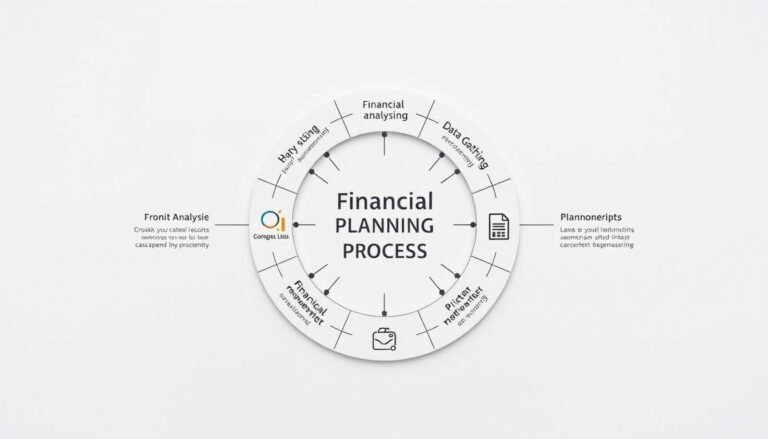Trusted Registered Financial Advisors – Get Expert Guidance
Registered financial advisors and planners help clients with investments and retirement plans. They create strategies to grow wealth and meet financial goals. They also guide on managing assets and making tax and investment choices.
CAPTRUST has been a top financial advisor for over 30 years. They offer investment management and retirement solutions. Their team works with endowments and foundations, managing hundreds of billions in assets. CAPTRUST provides personalized service for all clients, big or small.
Choosing a registered financial advisor means getting expert advice. Costs vary, from 0.25% for robo-advisors to 1% for traditional advisors. Fee-only fiduciaries focus on client interests, offering clear advice. CAPTRUST is employee-owned, showing their dedication to client success.
Key Takeaways
- Registered financial advisors offer expert advice on investments and retirement planning.
- CAPTRUST’s 30+ years of experience supports endowments and foundations with billions in assets.
- Fee structures vary, from 0.30% at Vanguard to $5,000 for comprehensive financial plans.
- Trusted advisors like CAPTRUST ensure personalized service for clients of all sizes.
- Choosing a fiduciary ensures advice is free from conflicted incentives.
What is a Registered Financial Advisor?
A registered financial advisor is a professional who can give investment advice and manage money for clients. They work with both individuals and businesses to plan for financial goals. Their job involves analysis, planning, and following strict rules.
Definition and Role
These advisors need licenses from the SEC or state agencies. They guide clients on investments, retirement, and taxes. For example, RIAs must pass the Series 65 exam to act as fiduciaries. This means they put their clients’ needs first, not their own profits.
Importance of Registration
In the U.S., over 600,000 advisors follow SEC or FINRA rules. Being registered means they meet high standards of ethics and education. Firms with over $110 million assets must register with the SEC. Smaller RIAs are overseen by states.
This setup keeps clients safe from unqualified advisors. It also makes sure fees are clear, often based on assets or hours worked.
How They Differ from Other Financial Advisors
Registered financial advisors have a higher duty than brokers. Brokers only need to ensure investments are suitable. But RIAs must choose options that best serve the client, not just those that make more money.
This difference is key for building trust and achieving long-term financial success.
Benefits of Working with a Registered Financial Advisor
Getting financial advice that fits your life is key to success. Registered advisors do more than manage money. They create plans that grow with you. A fiduciary advisor puts your goals first, making sure every choice supports your vision.
They can help with taxes, protect your retirement, and plan for your estate. Let’s see how this partnership can change your financial path.
Personalized Financial Plans
A wealth management advisor makes plans just for you. They consider your goals, how much risk you can take, and your dreams. Whether it’s for school, retirement, or leaving a legacy, they create custom solutions.
Studies show that understanding your needs can help you reach your goals 70% faster. They keep your plans up-to-date, adjusting to changes in your life like new jobs or family additions.
Access to Comprehensive Resources
Advisors use advanced tools and a wide range of investments. They help you beat the market by 1.5-3% each year. They also handle taxes, optimize retirement accounts, and use technology to match your risk level.
This approach boosts client satisfaction by 40%. It shows how valuable their guidance is.
Ongoing Support and Adaptation
Life can throw surprises like market changes or job loss. A registered advisor keeps you calm and focused. They help you avoid making rash decisions, keeping you 50% less likely to sell in bad times.
They regularly check your plans to make sure they still match your goals. With 90% of clients feeling more confident after working with an advisor, their support is crucial for long-term success.
How to Choose the Right Registered Financial Advisor
Finding the right financial advisor takes time and effort. Look for those with the Certified Financial Planner (CFP) title. They have deep knowledge in taxes, retirement, and ethics. Make sure they are registered with the SEC or FINRA to follow strict rules.
Credentials and Qualifications
Check if the Certified Financial Planner has the right licenses and no past issues. Use FINRA’s BrokerCheck and the SEC’s IAPD database for this. A CFP means they know how to plan your finances well. Also, they must follow strict rules.
See if they have experience with clients like you. This shows they understand your needs.
Understanding Fee Structures
Fees can differ a lot. Vanguard charges 0.30% of what you invest, for example. Some charge by the hour or get paid through commissions. Ask how their fees work with what they offer.
Stay away from advisors who make money by selling products. Clear fees help you trust them more and avoid surprises.
Importance of Compatibility
Good partnerships share goals and communicate well. Meet them to see if you’re a good match. Over 70% of clients want clear talks, so make sure they explain things simply.
Trust your gut. If you feel comfortable with them, you’ll work well together for a long time.
Common Services Offered by Registered Financial Advisors
Registered financial advisors offer custom solutions for complex financial situations. They help with investments, retirement planning, and tax optimization. Their advice is based on your specific goals.
Investment Management
Investment advisors create and manage portfolios that fit your risk level and goals. They use strategies like diversification and rebalancing to grow your wealth safely. They also regularly check your investments to keep them in line with market changes and life events.
Retirement Planning
Financial planners focus on making retirement plans. They figure out how much you need to save, estimate your retirement income, and plan for withdrawals. They also help with timing Social Security claims and planning for eldercare or inheritance, ensuring your financial future is secure.
Tax Strategies
Expert advisors include tax-smart decisions in every plan. They use tax-loss harvesting to lower your tax burden. They work with tax experts to make sure your investments fit your overall financial plan.
Questions to Ask Your Registered Financial Advisor
Choosing the right financial advisor is all about clear talk. Start by asking specific questions to make sure they match your goals. Over 40% of investors want to know an investment advisor’s approach, so start by asking about their strategies.
Clarifying Their Investment Philosophy
Ask how they balance risk and growth. Do they prefer active or passive strategies? What does success mean to them? A fiduciary advisor will explain how they measure success.
For example, ask: “How do you align portfolios with market indices?”
Understanding Communication Preferences
Talk about how you like to be contacted. Do they send monthly reports or updates as they happen? Over 85% of advisors value communication, so ask: “How often do you review portfolios?”
Also, ask: “What’s your process during market downturns?”
Fee Transparency Queries
Ask for a clear list of all fees. Find out if they charge based on performance or a fixed percentage. A fiduciary advisor should also share any potential conflicts of interest.
Example: “Are all costs itemized in writing?”
| Question | Why It Matters | Example Answer |
|---|---|---|
| What’s your investment philosophy? | Ensures strategy matches your goals | “We focus on long-term growth with low-risk ETFs” |
| How do you communicate updates? | Avoids misunderstandings | “Weekly email summaries and quarterly reviews” |
| What fees apply? | Prevents hidden costs | “0.5% management fee plus custodian charges” |
The Regulatory Landscape for Registered Financial Advisors
Knowing the rules for registered financial advisors helps keep your money safe. These laws make sure advisors act fairly and openly. This protects your savings.
The SEC watches over advisors with more than $110 million. They need to have their books checked and keep detailed records. If they break the rules, they could face big fines or lose their license.
Even advisors with $25 million or more in assets must follow these rules. This makes sure your money is safe.
FINRA checks on broker-dealers to make sure they act right. In 2022, they fined 18 firms for not following the rules. Now, advisors must use secure ways to talk to clients.
A fiduciary advisor has to act in your best interest. They can’t choose products just to make more money. They must tell you clearly how much they charge.
Tips for Building a Successful Relationship with Your Advisor
Building a strong bond with a wealth management advisor or financial planner takes effort from both sides. Start by making sure your goals match theirs. This way, every decision is guided by your shared vision. “Your financial advisor will become a trusted partner in your journey toward financial security,” says expert advice. Here’s how to build that connection well.
Setting Clear Goals
First, write down what you want to achieve, like saving for a house, education, or retirement. Be clear about your timelines and what matters most to you. A financial planner can then create plans that fit your goals, adjusting as your life changes.
Regular Check-Ins
Make sure to meet regularly, whether it’s every quarter or year, to check on your progress. Before each meeting, make a list of what you need to discuss and ask questions. Many advisors suggest meeting every 6–12 months to keep up with market changes or personal milestones.
Open Communication
Always share important life updates, like new jobs, family additions, or financial challenges. Don’t hesitate to ask about fees, risks, or strategies. Being open builds trust, making sure your wealth management advisor understands your needs.
| Tip | Why It Matters | Example |
|---|---|---|
| Define Goals | Guides long-term strategy | Agree on a 10-year retirement roadmap |
| Set Review Dates | Ensures plans stay on track | Biannual meetings to reassess risk tolerance |
| Share Updates | Keeps advice relevant | Notify advisor about inheritance or job changes |
The Role of Technology in Financial Advising
Technology is changing how investment advisors and certified financial planners work. New tools make their services faster and more tailored to each client. For example, AI helps analyze portfolios in real time, keeping strategies up to date.
Tools for Portfolio Management
Today’s investment advisors use AI to track and adjust portfolios. These tools cut down on mistakes and give detailed reports. Platforms like Morningstar or Bloomberg offer quick access to data, helping advisors make smart choices.
Online Communication Platforms
Secure online portals and apps let clients check their accounts anytime. Video calls and encrypted messages keep conversations private. Certified financial planners can share documents instantly, reducing paperwork.
Staying Informed with Market Trends
Advisors use real-time data and predictive analytics to stay on top of the market. Tools like Reuters or TradingView provide the latest news and trends. This helps advisors adjust plans to meet client goals.
| Technology Area | Tools/Platforms | Client Benefits |
|---|---|---|
| Portfolio Management | AI analytics, automated rebalancing | Efficient adjustments, real-time insights |
| Communication | Secure portals, video conferencing | 24/7 access, seamless updates |
| Market Analysis | Real-time data APIs, trend dashboards | Informed decisions, proactive strategy updates |
Understanding the Costs of Hiring a Registered Financial Advisor
Choosing a wealth management advisor or financial planner means knowing how costs fit your goals. Fees change based on services and how much you invest. For example, some advisors might charge 0.30% of your assets, which is $30 for every $10,000 you have. Let’s look at how these costs add up.

Common Fee Structures Explained
| Fee Type | How it Works | Typical Range |
|---|---|---|
| Asset-Based | Percentage of total investments managed | 0.30%–1.5% |
| Hourly | Paid per consultation hour | $150–$300/hour |
| Flat Fees | Fixed price for specific services | $1,000–$5,000/year |
| Commission | Based on product purchases | Varies by product |
Balancing Cost and Value
A financial planner might charge 1% of your assets, which is $5,000 a year for a $500,000 portfolio. This could include tax strategies, retirement planning, and regular check-ins. Look at what you get for your money. For example, a wealth management advisor with $2.2M in assets might get performance-based fees, saving you money in the long run.
When to Reassess Advisor Costs
It’s time to look at fees again if your life changes, like losing a job, getting an inheritance, or seeing big investment gains. If your returns are 2%+ less than expected, talk about changing fees. It’s important to be clear about costs and services. Ask for Form ADV disclosures to understand all costs and what you’re getting.
The Future of Financial Advising
Financial advising is changing, using new tools and old wisdom. Registered financial advisors and certified planners lead this change. They help clients keep up with market changes and personal goals.
Emerging Trends in the Industry
Now, financial planning is more about the whole picture, not just selling products. Over 78% of adults like digital banking, but they still want human advice for big choices. New models, like monthly fees, make expert advice more accessible.
The focus is on personalized, lifelong planning. This includes helping with student loans and planning for retirement.
Impact of AI and Automation
AI helps with tasks like data analysis, freeing advisors to talk strategy with clients. Robo-advisors manage $1.2 trillion, but they work alongside humans. Tools like Digital Vaults make managing documents easier, reducing stress for clients.
Advisors can now focus on important planning. This includes estate strategies and tax planning.
Focus on Sustainable Investing
Ethical investing is growing, with ESG assets over $30 trillion. Certified planners add sustainable options to match clients’ values. This change meets the demand for transparent, purposeful wealth management.
As tech and generations change, advisors play a key role. They help with the $84 trillion wealth transfer and use AI. Trusted advisors are crucial for clients’ long-term financial health.
FAQ
What is a registered financial advisor?
Why is registration important for financial advisors?
How do registered financial advisors differ from other financial professionals?
What benefits can I expect when working with a registered financial advisor?
How do I choose the right registered financial advisor?
What common services do registered financial advisors offer?
What questions should I ask my registered financial advisor during an interview?
What regulatory frameworks govern registered financial advisors?
How can I build a successful relationship with my financial advisor?
How is technology impacting the financial advisory industry?
What costs are associated with hiring a registered financial advisor?
What does the future of financial advising look like?
Source Links
- Homepage – https://www.captrust.com/
- Top Financial Advisors: Best Firms for 2025 – NerdWallet – https://www.nerdwallet.com/best/investing/financial-advisors
- Registered Financial Professionals – https://www.finra.org/investors/investing/working-with-investment-professional/registered-financial-professionals
- Becoming a Registered Investment Advisor (RIA) – https://www.investopedia.com/articles/professionals/041013/becoming-registered-investment-advisor.asp
- What Is a Registered Investment Advisor (RIA)? – NerdWallet – https://www.nerdwallet.com/article/investing/registered-investment-advisor
- Benefits of working with a financial advisor – New (US|EN) – https://www.edwardjones.com/us-en/working-financial-advisor/benefits-working-financial-advisor
- Three Benefits of Working with a Financial Advisor – https://www.guidestone.org/Resources/Education/Articles/Retirement/Three-Benefits-of-Working-with-a-Financial-Advisor
- Financial Advice – Vanguard Personal Advisor Select | Vanguard – https://investor.vanguard.com/advice/personal-financial-advisor
- How to Choose the Right Financial Advisor for Your Needs — Sales Coaching and Marketing Agency for wealth managers – https://www.selectadvisorsinstitute.com/investor/how-to-find-a-trusted-financial-advisor
- What Does a Financial Advisor Do and Should I Get One? – https://www.ml.com/articles/what-does-a-financial-advisor-do.html
- What Does a Financial Advisor Do? – https://www.kaplanfinancial.com/resources/getting-started/what-does-a-financial-advisor-do
- We’re here to help you get started – https://www.edwardjones.com/us-en/working-financial-advisor/questions-ask-financial-advisor
- 10 Questions to Ask a Financial Advisor – NerdWallet – https://www.nerdwallet.com/article/investing/10-questions-ask-financial-advisor
- Regulatory compliance 101 for registered investment advisors – https://www.wipfli.com/insights/articles/wam-regulatory-compliance-101-for-registered-investment-advisors
- Navigating the Regulatory Landscape for Investment Advisers – https://www.commonwealth.com/insights/navigating-the-regulatory-landscape-for-investment-advisers
- How to Choose a Financial Advisor – NerdWallet – https://www.nerdwallet.com/article/investing/how-to-choose-a-financial-advisor
- Investment Adviser Guide – NASAA – https://www.nasaa.org/industry-resources/investment-advisers/investment-adviser-guide/
- Investment Advisers – https://www.finra.org/investors/investing/working-with-investment-professional/investment-advisers
- Registered Investment Advisor (RIA): Definition, Duties, and Responsibilities – https://www.investopedia.com/terms/r/ria.asp
- Future Of Financial Advice: How 2030 Will Differ From Today – https://www.kitces.com/blog/future-of-financial-advice-technology-trends-value-service-engagement-attia/
- What the Next Decade Holds for Financial Advisors – https://www.investopedia.com/articles/financial-advisors/021216/what-next-decade-holds-financial-advisors.asp
- The Financial Advisor of the Future: Are You Ready? – https://www.futurevault.com/blog/the-financial-advisor-of-the-future







